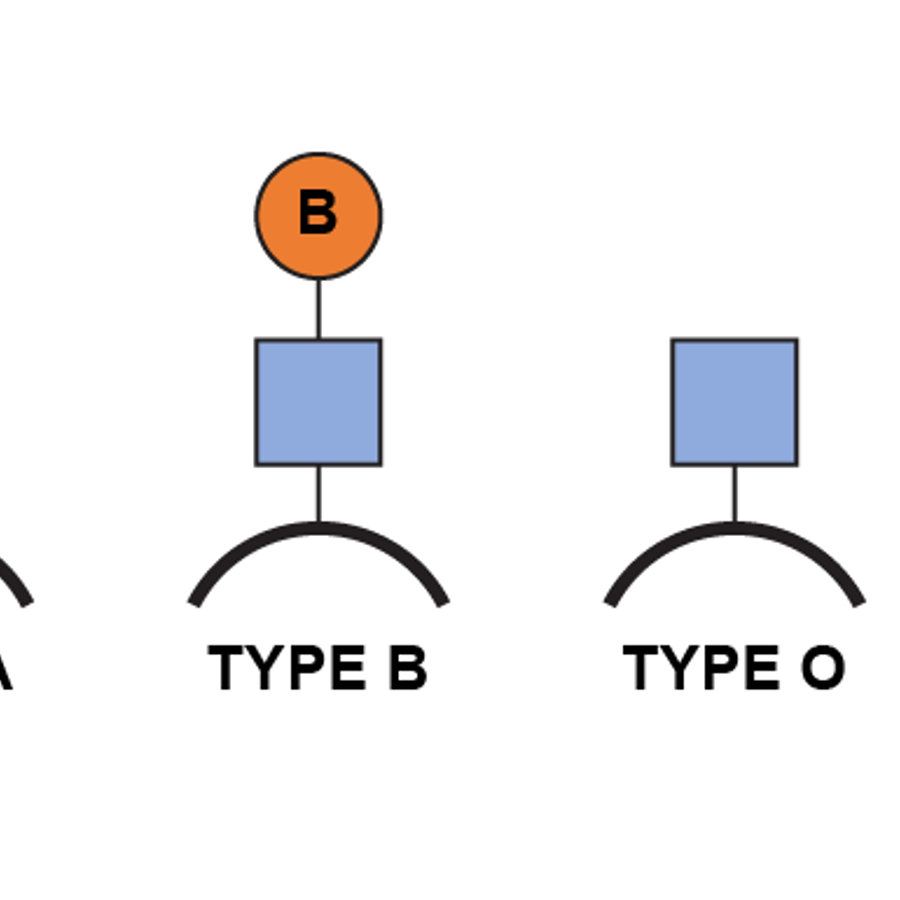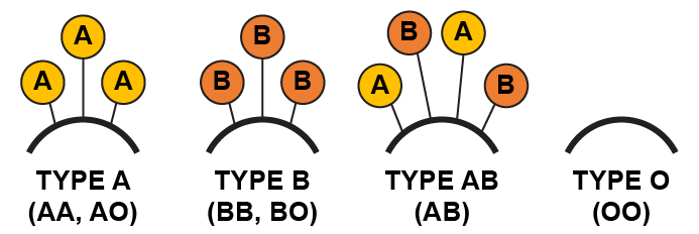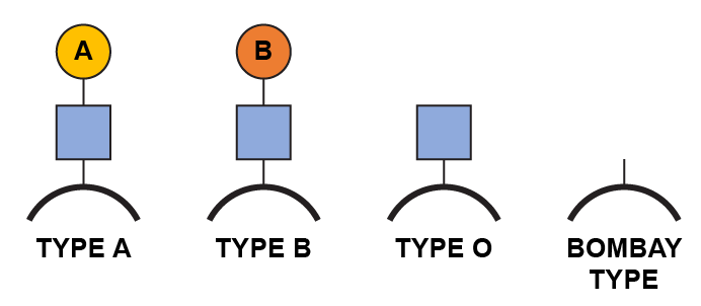
I have AB blood, and my dad was type O (and also Bombay). Is that possible?
June 1, 2011

- Related Topics:
- Blood type,
- Rare events,
- Bombay blood group,
- ABO blood type
A curious adult from Kansas asks:
"My mom was A blood type and I am AB. I believe my dad was O although he also is Bombay blood group. I was told this means my dad was not my dad, is that true?"
This answer was written by a Stanford student enrolled in BIO-161. These students were assigned this question to answer and we picked the answer that best fit this website. Enjoy!
Don't worry! A type O dad can definitely have a type AB child, if he has the Bombay blood group. At first, this may seem strange if you know anything about the genetics of blood types. You probably think that:
- An A mom and an O dad should only be able to have A and O kids
- A type O parent shouldn’t be able to have an AB child
The key point is that although your dad may appear to be O in a blood test, he might not actually be O genetically. The tricky part of having the Bombay blood group is that people will look O no matter what their blood group actually is.
To understand how this can happen, we need to take a step back and talk about genes, proteins, and blood types. Then we will see how your dad pulled off the seemingly impossible!
Genes and Proteins
Each gene carries the instructions for one small part of us. For example, one gene may specify whether we have blood type A, B, O, or AB. A group of genes may determine whether we are male or female.
On its own, a gene doesn't do much though. It is simply a set of instructions.
Imagine buying a model car kit. Without the parts to build the car, the instruction manual isn't very useful. Similarly, genes on their own don't do much without the parts to build something.
That something is a protein. A gene has the instructions for how to make a specific protein. And the protein then goes out and does something.
Think back to the car kit. The instruction manual specifies how to put the parts of the car together. Similarly, genes have the codes to build specific proteins, which then perform all the work that a cell needs to do.
Blood Types
ABO Gene
One of the genes that codes for the proteins determining blood type is called the ABO gene. Just like other genes, we have two copies of the gene, one from mom and one from dad.
The ABO gene can either code for protein A, protein B, or neither. When it codes for neither, it is called O.
A person's two ABO genes can fall into any of the following blood types:
- Type A blood: Both genes code for A, or one gene codes for A and the other one codes for nothing.
- Type B blood: Both genes code for B, or one gene codes for B and the other gene codes for nothing
- Type AB blood: One gene codes for A and the other gene codes for B
- Type O blood: Neither gene codes for A nor B

If your mom has type A blood and your dad actually does have type O blood, what would your blood type be? Let's reason this out, thinking about the genes that are passed down from parents to children.
Your dad can only have two O versions of the ABO gene, because neither of his ABO copies code for anything. He can only give you an O.
Your mom can have one of two different sets of ABO genes. She could either have two A versions or an A and an O. If she has two A's, then she can only pass you an A and if she has an A and an O, then she can pass either an A or an O.
So you can get an A or an O from mom and only an O from dad. Since you get one gene from each of them, you can either be Type A or Type O and not AB. But that is only if your dad really is Type O...
(Click here if you want to read more about how your two sets of ABO genes affect your blood type, and how these genes are inherited.)
The H Gene
Up until now, I have been talking about blood type as if it comes from a single gene. It actually doesn't. It turns out that there are multiple genes involved in making Type A, B, AB, and O blood.
To understand your situation, we need to look at one of these other genes, called H. This gene codes for the H protein.
We don't usually talk about the H gene when we talk about blood type because it almost always works fine. But very rarely , as in your dad's case, this gene doesn't work quite right. Then we start to see things we wouldn't usually expect in blood type inheritance, such as A and O parents having an AB child.
In reality, the ABO gene doesn't actually hold the instructions for making A or B proteins. Rather, the ABO gene codes for proteins that turn the H protein into A or B.
So people who don't make H can't make A or B. There is nothing for the ABO gene to work on.
That makes the blood types look more like this:

Now we understand the Bombay blood type. These folks can't make H so their ABO gene can't make A or B. For example, they might have the B version of the ABO gene but can't make any B protein because they don't make any H.
But why do Bombay folks look O? Because of how blood tests work. Blood typing tests work by looking for the A and B proteins. If they find A, you have A blood type, B you have B blood type and if you have both, you are AB. And if you don't have either, you are O blood type.
So if a test doesn't find A or B, then the person is probably O. Unless of course they are Bombay!
Bombay folks don't make H and so couldn't make A if their ABO gene was the A type. They also couldn't make B if their ABO gene was B. This means they look O no matter what their actual ABO gene is.
He's Your Dad!
Now we can explain your results. Most likely your dad has at least one B version of the ABO gene, but it is masked by his broken H gene. He passed that B to you (and you got an A from your mom) and now you are AB.
In other words, your dad cannot make the H protein required to make A or B. So it is possible that at least one of his ABO genes codes for the B protein. You simply don't see it in his blood test because he doesn't make the H protein that is required upstream.
If your dad can carry a B protein, and your mom is type A, then it is perfectly reasonable that you ended up AB! You got an ABO gene coding for A protein from mom, and an ABO gene coding for B protein from dad.
Moral of the story: don't worry so much about what other people say. Especially when they aren't professionals!

Author: Elizabeth Burstein
When this answer was published in 2011, Elizabeth was a Stanford undergraduate enrolled in BIO-161.
 Skip Navigation
Skip Navigation
